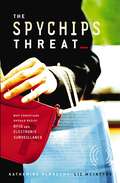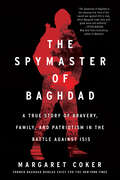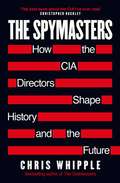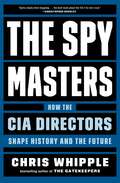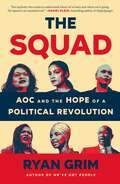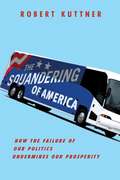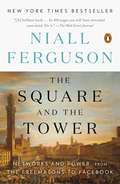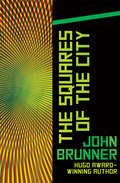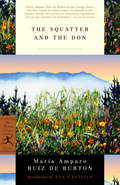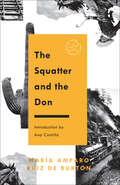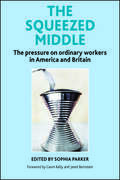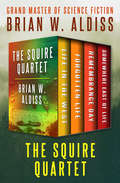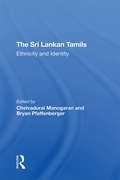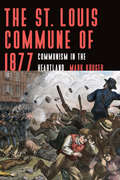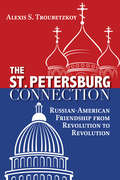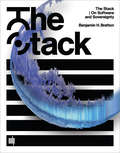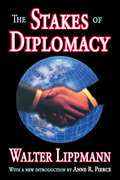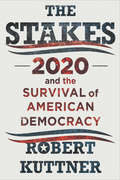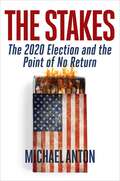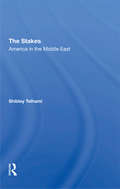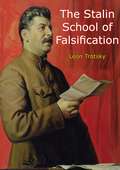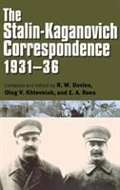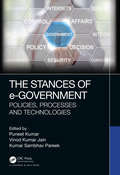- Table View
- List View
The Spychips Threat: Why Christians Should Resist RFID and Electronic Surveillance
by Katherine AlbrechtEver feel like you're being watched? This eye-opening book shows how a new technology may soon track your every move . . . and pave the way for the fulfillment of end-time biblical prophecy.A revolutionary technology called RFID (Radio Frequency IDentification) is poised to expose our habits, secrets, and slip-ups to money-hungry marketers, savvy criminals, and government snoops. One day soon, our shoes could keep track of our footsteps. Stores could ID us as we walk in the door. Hidden "tracking units" could log even our restroom visits.Global corporations and government agencies have already invested millions in a plan that uses tiny microchips to uniquely number and track everyday items. Parts of this Orwellian vision are uncannily similar to the prophesies of Revelation. Chipping inanimate objects is just the start-the endpoint is a form of RFID that can be injected into the flesh. This work-an updated version of Katherine Albrecht and Liz McIntyre's controversial and award-winning book Spychips-is a clarion call to Christians to take a stand against plans to monitor and control people through this unnerving new technology.Using public records, real-world examples, and biblical prophesies, Albrecht and McIntyre uncover the frightening story behind RFID and show us how to protect our privacy and civil liberties while there's still time.
The Spymaster of Baghdad: A True Story of Bravery, Family, and Patriotism in the Battle against ISIS
by Margaret CokerFrom the former New York Times bureau chief in Baghdad comes the gripping and heroic story of an elite, top-secret team of unlikely spies who triumphed over ISIS. The Spymaster of Baghdad tells the dramatic yet intimate account of how a covert Iraqi intelligence unit called “the Falcons” came together against all odds to defeat ISIS. The Falcons, comprising ordinary men with little conventional espionage background, infiltrated the world’s most powerful terrorist organization, ultimately turning the tide of war against the terrorist group and bringing safety to millions of Iraqis and the broader world. Centered around the relationship between two brothers, Harith al-Sudani, a rudderless college dropout who was recruited to the Falcons by his all-star younger brother Munaf, and their eponymous unit commander Abu Ali, The Spymaster of Baghdad follows their emotional journey as Harith volunteers for the most dangerous mission imaginable. With piercing lyricism and thrilling prose, Coker’s deeply-reported account interweaves heartfelt portraits of these and other unforgettable characters as they navigate the streets of war-torn Baghdad and perform heroic feats of cunning and courage.The Falcons’ path crosses with that of Abrar, a young, radicalized university student who, after being snubbed by the head of the Islamic State’s chemical weapons program, plots her own attack. At the near-final moment, the Falcons intercept Abrar’s deadly plan to poison Baghdad’s drinking water and arrest her in the middle of the night—just one of many covert counterterrorism operations revealed for the first time in the book. Ultimately, The Spymaster of Baghdad is a page-turning account of wartime espionage in which ordinary people make extraordinary sacrifices for the greater good. Challenging our perceptions of terrorism and counterterrorism, war and peace, Iraq and the wider Middle East, American occupation and foreign intervention, The Spymaster of Baghdad is a testament to the power of personal choice and individual action to change the course of history—in a time when we need such stories more than ever.
The Spymasters: How The Cia Directors Shape History And The Future
by Chris WhippleFrom the New York Times bestselling author of The Gatekeepers, a remarkable, behind-the-scenes look at what it's like to run the world's most powerful intelligence agency, and how the CIA is often a crucial counterforce against presidents threatening to overstep the powers of their office. Only 11 men and one woman are alive today who have made the life-and-death decisions that come with running the world's most powerful and influential intelligence service. With unprecedented, deep access to nearly all these individuals, Chris Whipple tells the story of an agency that answers to the United States president, but whose activities — spying, espionage, and covert action — take place on every continent. At pivotal moments, the CIA acts as a brake on rogue presidents, starting in the mid-seventies with DCI Richard Helms&’ refusal to conceal Richard Nixon&’s criminality and continuing recently as the actions of a CIA whistleblower ignited impeachment proceedings against Donald Trump. Since its inception in 1947, the Central Intelligence Agency has been a powerful player on the world stage, operating largely in the shadows to protect American interests. For The Spymasters, Whipple conducted extensive, exclusive interviews with nearly every living CIA director, pulling back the curtain on the world's elite spy agency and showing how the CIA partners — or clashes — with counterparts in Britain, France, Germany, Israel, Jordan, Saudi Arabia and Russia. Topics covered in the book include attempts by presidents to use the agency for their own ends; simmering problems in the Middle East and Asia; rogue nuclear threats; and cyberwarfare. The Spymasters recounts seven decades of CIA activity and elicits predictions about the issues — and threats — that will engage the attention of future operatives and analysts. Including eye-opening interviews with George Tenet, John Brennan, Leon Panetta and David Petraeus, as well as those who've just recently departed the agency, this is a timely, essential and important contribution to current events.
The Spymasters: How the CIA Directors Shape History and the Future
by Chris WhippleFrom the New York Times bestselling author of The Gatekeepers, a remarkable, behind-the-scenes look at what it’s like to run the world’s most powerful intelligence agency, and how the CIA is often a crucial counterforce against presidents threatening to overstep the powers of their office. <p><p> Only eleven men and one woman are alive today who have made the life-and-death decisions that come with running the world’s most powerful and influential intelligence service. With unprecedented, deep access to nearly all these individuals plus several of their predecessors, Chris Whipple tells the story of an agency that answers to the United States president alone, but whose activities—spying, espionage, and covert action—take place on every continent. At pivotal moments, the CIA acts as a brake on rogue presidents, starting in the mid-seventies with DCI Richard Helms’s refusal to conceal Richard Nixon’s criminality and continuing to the present as the actions of a CIA whistleblower have ignited impeachment proceedings against Donald Trump. <p> Since its inception in 1947, the Central Intelligence Agency has been a powerful player on the world stage, operating largely in the shadows to protect American interests. For The Spymasters, Whipple conducted extensive, exclusive interviews with nearly every living CIA director, pulling back the curtain on the world’s elite spy agencies and showing how the CIA partners—or clashes—with counterparts in Britain, France, Germany, Israel, Jordan, Saudi Arabia, and Russia. Topics covered in the book include attempts by presidents to use the agency for their own ends; simmering problems in the Middle East and Asia; rogue nuclear threats; and cyberwarfare. <p> A revelatory, behind-the-scenes look, The Spymasters recounts seven decades of CIA activity and elicits predictions about the issues—and threats—that will engage the attention of future operatives and analysts. Including eye-opening interviews with George Tenet, John Brennan, Leon Panetta, and David Petraeus, as well as those who’ve just recently departed the agency, this is a timely, essential, and important contribution to current events.
The Squad: AOC and the Hope of a Political Revolution
by Ryan GrimSemafor's Best Political Book of 2023A riveting insider account of the progressive movement in Congress centering A.O.C., Rashida Tlaib, Jamaal Bowman, Cori Bush, Ayanna Pressley, and Ilhan Omar—their rise, their efforts to set an ambitious agenda for the country, and their struggle to find their footing within the Democratic party. The Squad is the definitive, must-read book about the most exciting figures defining our new era. The story is urgent, and the stakes are high—for the country and the world—and Grim, an experienced political reporter who covered the Squad before they were the Squad, is uniquely qualified to tell it.When Bernie Sanders, an obscure Vermont senator, launched his quixotic 2016 presidential campaign, few could have seen just how radically the Democratic Party would transform in just a few short years—or that such a transformation could be led by a Bronx bartender volunteering for Bernie in her spare time. The world as it was when that campaign began is almost unrecognizable today, and the Squad has both shaped and been shaped by the seismic social, cultural, and political changes underway.Referred to informally as the Squad, led by the preternaturally politically savvy Alexandria Ocasio-Cortez, the group laid down a marker for an aggressive left-wing agenda. Grim takes you behind the scenes as that new energy makes impact with Washington, and the Squad spends as much time fending off assaults from Donald Trump—who regularly singled them out and led chants of “send them back” at rallies—as they did battling their own party’s sclerotic leadership. As they’ve grown in office, they’ve had to contend with the eternal question that confronts outsiders who power their way into the inside: Are they still radical organizers willing and able to lead a political revolution?
The Squandering of America: How the Failure of Our Politics Undermines Our Prosperity
by Robert KuttnerThe incomes of most Americans today are static or declining. Tens of millions of workers are newly vulnerable to layoffs and outsourcing. Health care and retirement burdens are increasingly being shifted from employers to individuals. Two-income families find they are working longer hours for lower wages, with decreased social support. As wealth has become more concentrated, the economy has become more recklessly speculative, jeopardizing not only the prospects of ordinary Americans, but the solvency of the entire system. What links these trends, writes Robert Kuttner in this provocative, engaging, and necessary book, is the consolidation of political and economic power by a narrow elite, who blocks the ability of government to restore broad prosperity to the majority of citizens. Kuttner--one of our most lucid economic critics--explores the roots of these problems and outlines a persuasive, bold alternative. InBusinessWeek,The Boston Globe, andThe American Prospect, he has established himself as a prophetic voice connecting economics and politics. Here he demonstrates how our economy has fallen hostage to a casino of financial speculation, creating instability as well as inequality. He debunks alarmist claims about supposed economic hazards, such as Social Security and Medicare, and exposes the genuine dangers: hedge funds and private equity run amok, sub-prime lenders, Wall Street middlemen, and America's dependence on foreign central banks. He describes how globalization of commerce has been used by business less to promote free trade than to escape the balanced regulation that delivered widespread abundance in the decades after World War II. While our financial security has weakened under President George W. Bush, Kuttner also faults many Democrats for failing to offer compelling alternatives. Now, with financial markets in crisis and public opinion supporting a more active role for government, he offers a new model of managed capitalism that can deliver security and opportunity, and rekindle democracy as a check on concentrated wealth. Here is a passionate, articulate naming of the problem and a call for reform. The Squandering of America sets out a path for reclaiming our democratic politics--and our prosperity.
The Square and the Tower: Networks and Power, from the Freemasons to Facebook
by Niall Ferguson<P>Most history is hierarchical- it's about popes, presidents, and prime ministers. But what if that's simply because they create the historical archives? What if we are missing equally powerful but less visible networks - leaving them to the conspiracy theorists, with their dreams of all-powerful Illuminati? The twenty-first century has been hailed as the Networked Age. But in The Square and the Tower, Niall Ferguson argues that social networks are nothing new. <P>From the printers and preachers who made the Reformation to the freemasons who led the American Revolution, it was the networkers who disrupted the old order of popes and kings. Far from being novel, our era is the Second Networked Age, with the computer in the role of the printing press. But networks have a dark side, prone to clustering, contagions, and even outages. And the conflicts of the past already have unnerving parallels today, in the time of Facebook, Islamic State and Trumpworld. <P><b>A New York Times Bestseller</b>
The Squares of the City
by John BrunnerHugo Award Finalist: &“Story plotting holding much in common with chess . . . An exciting political thriller in the vein of Graham Greene&” (Speculiction). In The Squares of the City, Brunner takes the moves of a classic championship chess game and uses them as the structure to build a novel about a revolution in a South American country obsessed with chess and dominated by a dictator who sees people as pawns in his game of power and survival. Intriguing premise, dramatic story, future setting, great entertainment. &“One of the most important science fiction authors. Brunner held a mirror up to reflect our foibles because he wanted to save us from ourselves.&” —SF Site
The Squatter and the Don
by Maria Amparo Ruiz de Burton“The Squatter and the Don,like its author, has come out a survivor,” notes Ana Castillo in her Introduction. “The fact that it has resurfaced after more than a century from its original publication is a testimony to its worthiness. ” Inviting comparison toUncle Tom’s Cabin, María Amparo Ruiz de Burton’s illuminating political novel is also an engaging historical romance. Set in San Diego shortly after the United States’ annexation of California and written from the point of view of a nativeCalifornio, the story centers on two families: the Alamars of the landed Mexican gentry, and the Darrells, transplanted New Englanders–and their tumultuous struggles over property, social status, and personal integrity. This Modern Library Paperback Classic is set from the first edition of 1885. Ana Castillois a poet, essayist, and novelist whose works includethe recent poetry collectionI Ask the Impossibleand the novelPeel My Love Like an Onion. She lives in Chicago and teaches at DePaul University. From the Trade Paperback edition.
The Squatter and the Don (Modern Library Torchbearers)
by Maria Amparo BurtonA historical romance with an activist heart, and an impassioned critique of U.S. expansionism—with an introduction by Ana Castillo, author of So Far from GodA fiercely partisan novel based on the author&’s own experiences, The Squatter and the Don follows two families living near San Diego shortly after the United States&’ annexation of California: the Alamares of the landed Mexican gentry, and the Darrells, the New Englanders who seek to claim the Alamares&’ land. When young Clarence Darrell falls in love with Mercedes Alamar, the stage is set for a conflict that blends the personal with the political. A scathing critique of corporate capitalism, this story exposes the true historical plight of californios as their lands are taken away by a government with incestuous ties to the railroad monopoly—institutions laced with the greed and racism of nineteenth-century America&’s expansionist agenda. The Modern Library Torchbearers series features women who wrote on their own terms, with boldness, creativity, and a spirit of resistance.
The Squeezed Middle: The Pressure on Ordinary Workers in America and Britain
by Sophia ParkerAs wages stagnate but living costs keep rising, the pressure on working people grows more intense. The issue of living standards has become one of the most urgent challenges for politicians in both Britain and America. 'The squeezed middle' brings together experts from both sides of the Atlantic to ask what the UK can learn from the US. American workers have not benefited from growth for an entire generation - the average American worker earned no more in 2009 than in 1975. Now British workers are undergoing a similar experience. No longer can they assume that when the economy grows their wages will grow with it. This collection brings together for the first time leading economic and policy thinkers to analyse the impact of different policies on those on low-to middle incomes and to explain what lessons the UK can learn from America's 'lost generation'. This timely book is essential reading for everyone concerned about the living standards crisis, an issue which could decide elections as well as shaping the future for millions of working families.
The Squire Quartet: Life in the West, Forgotten Life, Remembrance Day, and Somewhere East of Life (The Squire Quartet #1)
by Brian W. AldissFour loosely linked realistic novels from “one of Britain’s most accomplished and versatile writers” (The Guardian). A Hugo and Nebula Award–winning science fiction writer, British novelist Brian W. Aldiss also regularly “returned to earth with distinction,” penning realistic works, including the Squire Quartet (The New York Times). Comprised of “loosely interconnected novels following many characters through a twenty-first century landscape of insidious new technology and international political turmoil” (Booklist), here is the complete series from this “ambitious and gifted writer” (The Guardian). Life in the West: Thomas C. Squire, creator of the hit documentary series Frankenstein Among the Arts, one-time secret agent, and founder of the Society for Popular Aesthetics, is attending an international media symposium in Sicily. It is here that he becomes involved with the lovely but calculating Selina Ajdina. Alongside the drama of the conference is the story of Squire’s private life—the tale of his infidelity, the horrifying circumstances surrounding his father’s death, and the threatened future of his ancestral home in England. “[A] novel of ideas that is also eminently readable . . . a virtuoso performance.” —Publishers Weekly Forgotten Life: Analyst Clement Winters is trying to write a biography of his recently deceased older brother, Joseph. Through the writings Joseph left behind—letters, diaries, notes, and confessions—Clement realizes how vastly his perception of his sibling differs from reality. As Clement tries to make sense of Joseph’s life, he uncovers dark corners of his family history and even his own existence. “A realistic novel . . . imaginative richness . . . [a] many-layered venture into the extraordinariness of ordinary lives.” —The New York Times Remembrance Day: When four people are killed by a terrorist bombing in a small British seaside hotel, an American academic examines the details of the victims’ lives and histories to find the relationship between them and their fate. “Aldiss discovers fresh and arresting nuances in the dichotomy between blind chance and predestination in human affairs . . . original, disturbing, and memorable.” —Kirkus Reviews Somewhere East of Life: Architectural historian Roy Burnell has been tasked with traveling the globe and listing architectural gems in danger of being destroyed. But when Burnell is in Budapest, ten years of his memory, including his sexual experiences, are stolen. In this near future, where thieves sell memories on the black market, Burnell tries to resume his life, while also searching for the “bullet” that will restore his memory. “Intelligent, funny, and hopeful in spite of itself.” —Kirkus Reviews
The Sri Lankan Tamils: Ethnicity And Identity
by Chelvadurai Manogaran Bryan PfaffenbergerWithin the larger context of bitter ethnic strife in Sri Lanka, this timely volume assembles a multidisciplinary group of scholars to explore the central issue of Tamil identity in this South Asian country. Bringing historical, sociological, political, and geographical perspectives to bear on the subject, the contributors analyze various aspects of
The St. Louis Commune of 1877: Communism in the Heartland
by Mark KrugerFollowing the Civil War, large corporations emerged in the United States and became intent on maximizing their power and profits at all costs. Political corruption permeated American society as those corporate entities grew and spread across the country, leaving bribery and exploitation in their wake. This alliance between corporate America and the political class came to a screeching halt during the Great Railroad Strike of 1877, when the U.S. workers in the railroad, mining, canal, and manufacturing industries called a general strike against monopoly capitalism and brought the country to an economic standstill. In The St. Louis Commune of 1877 Mark Kruger tells the riveting story of how workers assumed political control in St. Louis, Missouri. Kruger examines the roots of the St. Louis Commune—focusing on the 1848 German revolution, the Paris Commune, and the First International. Not only was 1877 the first instance of a general strike in U.S. history; it was also the first time workers took control of a major American city and the first time a city was ruled by a communist party.
The St. Petersburg Connection: Russian-American Friendship from Revolution to Revolution
by Alexis S. TroubetzkoyA history of Russian-American relations from 1776 to 1917, when these two states, mostly antagonists since, were warm friends. A compelling account of Russian-American relations from the American Revolution of 1776 to the Bolshevik Revolution in Russia in 1917. Long before the Cold War, there was a seemingly unlikely connection between the two countries — one a champion of liberty and progress; the other an absolute monarchy and defender of tradition. Indeed, following Russia’s refusal to help Great Britain put down the rebellious colonists, there developed a relationship of warm friendship, robust trade, and mutual support between Russia and the newly formed United States of America. Over the course of the next century and a half, the relationship between Russia and America flourished and matured. The St. Petersburg Connection brings to life the events and figures that played a crucial role in that history, drawing a picture of a time when two of the great nations of the last century, often enemies since, were friends.
The Stack: On Software and Sovereignty (Software Studies)
by Benjamin H. BrattonA comprehensive political and design theory of planetary-scale computation proposing that The Stack—an accidental megastructure—is both a technological apparatus and a model for a new geopolitical architecture. What has planetary-scale computation done to our geopolitical realities? It takes different forms at different scales—from energy and mineral sourcing and subterranean cloud infrastructure to urban software and massive universal addressing systems; from interfaces drawn by the augmentation of the hand and eye to users identified by self—quantification and the arrival of legions of sensors, algorithms, and robots. Together, how do these distort and deform modern political geographies and produce new territories in their own image? In The Stack, Benjamin Bratton proposes that these different genres of computation—smart grids, cloud platforms, mobile apps, smart cities, the Internet of Things, automation—can be seen not as so many species evolving on their own, but as forming a coherent whole: an accidental megastructure called The Stack that is both a computational apparatus and a new governing architecture. We are inside The Stack and it is inside of us. In an account that is both theoretical and technical, drawing on political philosophy, architectural theory, and software studies, Bratton explores six layers of The Stack: Earth, Cloud, City, Address, Interface, User. Each is mapped on its own terms and understood as a component within the larger whole built from hard and soft systems intermingling—not only computational forms but also social, human, and physical forces. This model, informed by the logic of the multilayered structure of protocol “stacks,” in which network technologies operate within a modular and vertical order, offers a comprehensive image of our emerging infrastructure and a platform for its ongoing reinvention. The Stack is an interdisciplinary design brief for a new geopolitics that works with and for planetary-scale computation. Interweaving the continental, urban, and perceptual scales, it shows how we can better build, dwell within, communicate with, and govern our worlds.thestack.org
The Stadium: An American History of Politics, Protest, and Play
by Frank Andre GuridyThe "deep and impactful" story of the American stadium (Howard Bryant, author of Full Dissidence)—from the first wooden ballparks to today&’s glass and steel mega-arenas—revealing how it has made, and remade, American life. Stadiums are monuments to recreation, sports, and pleasure. Yet from the earliest ballparks to the present, stadiums have also functioned as public squares. Politicians have used them to cultivate loyalty to the status quo, while activists and athletes have used them for anti-fascist rallies, Black Power demonstrations, feminist protests, and much more. In this book, historian Frank Guridy recounts the contested history of play, protest, and politics in American stadiums. From the beginning, stadiums were political, as elites turned games into celebrations of war, banned women from the press box, and enforced racial segregation. By the 1920s, they also became important sites of protest as activists increasingly occupied the stadium floor to challenge racism, sexism, homophobia, fascism, and more. Following the rise of the corporatized stadium in the 1990s, this complex history was largely forgotten. But today&’s athlete-activists, like Colin Kaepernick and Megan Rapinoe, belong to a powerful tradition in which the stadium is as much an arena of protest as a palace of pleasure. Moving between the field, the press box, and the locker room, this book recovers the hidden history of the stadium and its important role in the struggle for justice in America.
The Stakes of Diplomacy
by Walter LippmannWalter Lippmann is arguably the most influential journalist in American history. From the time of Woodrow Wilson to the time of Lyndon Johnson, what Walter Lippmann said mattered. His word was valued because of his exceptional capacity for analysis, and because he had the rare ability to make complex ideas and problems manageable and understandable. Lippmann combined the practical and the theoretical and saw them as inseparable. He savored the life of the mind and relished the arena of politics. He was political philosopher, social commentator, political advisor, and activist-intellectual. As the country grappled with an impressive influx of European ideas and with the threatening press of European problems, so did Lippmann. Like President Wilson, he came to believe that the condition of the modern world required that America either act or be acted upon. New methods of communication and propaganda meant that ideas contrary to America's would be widely heard. Reformed liberalism and the projection of that liberalism into a troubled world were the best hedge against totalitarian schemes and imperialist aggression. The Stakes of Diplomacy resulted from Lippmann's assignment by Wilson's Secretary of War Baker, to a project for studying possible terms of peace and ways to influence the world in a liberal-democratic direction. The Stakes of Diplomacy ends both with admiration for the peaceful nature of democracies and a plea for their further influence in the world, and with an understanding that democracy's influence will depend partly upon its physical might and geopolitical collaboration. Lippmann stands as a prominent figure in America's twentieth-century quest for power with honor. He concludes this volume with the warning that there is no safe way and no morally feasible way to turn back from our dangerous mission: "Unless the people who are humane and sympathetic, the people who wish to live and let live, are masters of the situation, the world faces an indefinite vista of conquest and terror."
The Stakes: 2020 And The Survival Of American Democracy
by Robert KuttnerTo save both democracy and a decent economy, here’s why it’s crucial that Americans elect a truly progressive president. The 2020 presidential election will determine the very survival of American democracy. To restore popular faith in government—and win the election—Democrats need to nominate and elect an economic progressive. The Stakes explains how the failure of the economy to serve ordinary Americans opened the door to a demagogic president, and how democracy can still be taken back from Donald Trump. Either the United States continues the long slide into the arms of the bankers and corporate interests and the disaffection of working Americans—the course set in the past half century by Republican and Democratic presidents alike—or we elect a progressive Democrat in the mold of FDR. At stake is nothing less than the continued success of the American experiment in liberal democracy. That success is dependent on a fairer distribution of income, wealth, and life changes —and a reduction in the political influence of financial elites over both parties. The decay of democracy and economic fairness began long before Trump. The American republic is in need of a massive overhaul. It will take not just a resounding Democratic victory in 2020 but a progressive victory to pull back from the brink of autocracy. The Stakes demonstrates how a progressive Democrat has a better chance than a centrist of winning the presidency, and how only this outcome can begin the renewal of the economy and our democracy. A passionate book from one of America’s best political analysts, The Stakes is the book to read ahead of the 2020 primaries and general election.
The Stakes: America at the Point of No Return
by Michael AntonTwo months before the 2016 presidential election, an anonymously published essay titled "The Flight 93 Election" rallied conservatives to "charge the cockpit" by voting for Trump. Michael Anton, the author of that controversial viral essay, now says that the last few years have only served to prove his "Flight 93" thesis: the left has become more aggressive, more vindictive, and more dangerous—and the stakes have never been higher. To reframe the upcoming 2020 election, Anton looks at California: a state that has descended from a middle-class paradise into crumbling, crowded chaos under unchallenged Democrat rule. Where California goes, so goes the United States of America, Anton argues—unless conservatives take a stand.
The Stakes: The Consequences of Power and the Choice of Peace
by Telhami ShibleyHow we should have responded to 9-11.
The Stakes: Univ Of Md Edition
by Shibley TelhamiThis book presents an intriguing analysis of American stakes in the Middle East and a thoughtful argument for the compassionate and measured use of force. It explains Arab and Muslim attitudes towards the United States and shows why there is much reason for concern.
The Stalin School of Falsification
by Leon TrotskyBanished from the Soviet Union in 1929, one of Leon Trotsky’s first political tasks was to produce this damning reply to the falsification and re-writing of Bolshevik history carried out by the Soviet Communist Party’s Stalinist leadership. Trotsky’s decisive role in the October Revolution, the Russian Civil War and the first years of Soviet Russia, is exhaustively documented in his ‘Letter to the Bureau of Party History’, which was refused publication in the Soviet Union and forms the main section of this book.Also included is material exposing the fraudulent attempts to re-cast Stalin and his aides as key figures in the Russian Revolution, which involved suppressing and tampering with historical records. Other documents refute Stalin’s spurious theory of ‘Trotskyism’ which, as Trotsky’s evidence proves, was devised solely to discredit the Opposition’s fight for revolutionary Bolshevik principles and justify the Stalinist bureaucracy’s distortion of Leninism.Finally, in this book we have Trotsky’s own indictment of the bureaucracy’s disastrous anti-Leninist policies in action contained in his defence of the Joint Opposition against its expulsion from the Communist Party in 1927.
The Stalin-Kaganovich Correspondence, 1931-1936
by Joseph V. Stalin L. M. Kaganovich R. W. Davies Oleg V. Khlevniuk Liudmila P. Kosheleva E. A. Rees Larisa A. Rogovaya Steven ShabadThe Stalin-Kaganovich correspondence is an important and unique historical source, which no historian engaged in research on Soviet history of the 1930s can ignore. In 1931-36 Stalin entrusted the function of acting as his deputy on party questions to Lazar Moiseyevich Kaganovich, and during the next few years Kaganovich's influence continually increased. Although this post was not authorized by any specific party decision, it was in effect the second most important post in the Central Committee. Kaganovich was in charge of the work both of the Orgburo (Organizational Bureau) of the Central Committee and of several of the most important Central Committee departments, and he managed the sittings of the Politburo during Stalin's absence on vacation and chaired numerous Politburo commissions.
The Stances of e-Government: Policies, Processes and Technologies
by Vinod Kumar Jain Puneet Kumar Kumar Sambhav PareekThis book focuses on the three inevitable facets of e-government, namely policies, processes and technologies. The policies discusses the genesis and revitalization of government policies; processes talks about ongoing e-government practices across developing countries; technology reveals the inclusion of novel technologies.
